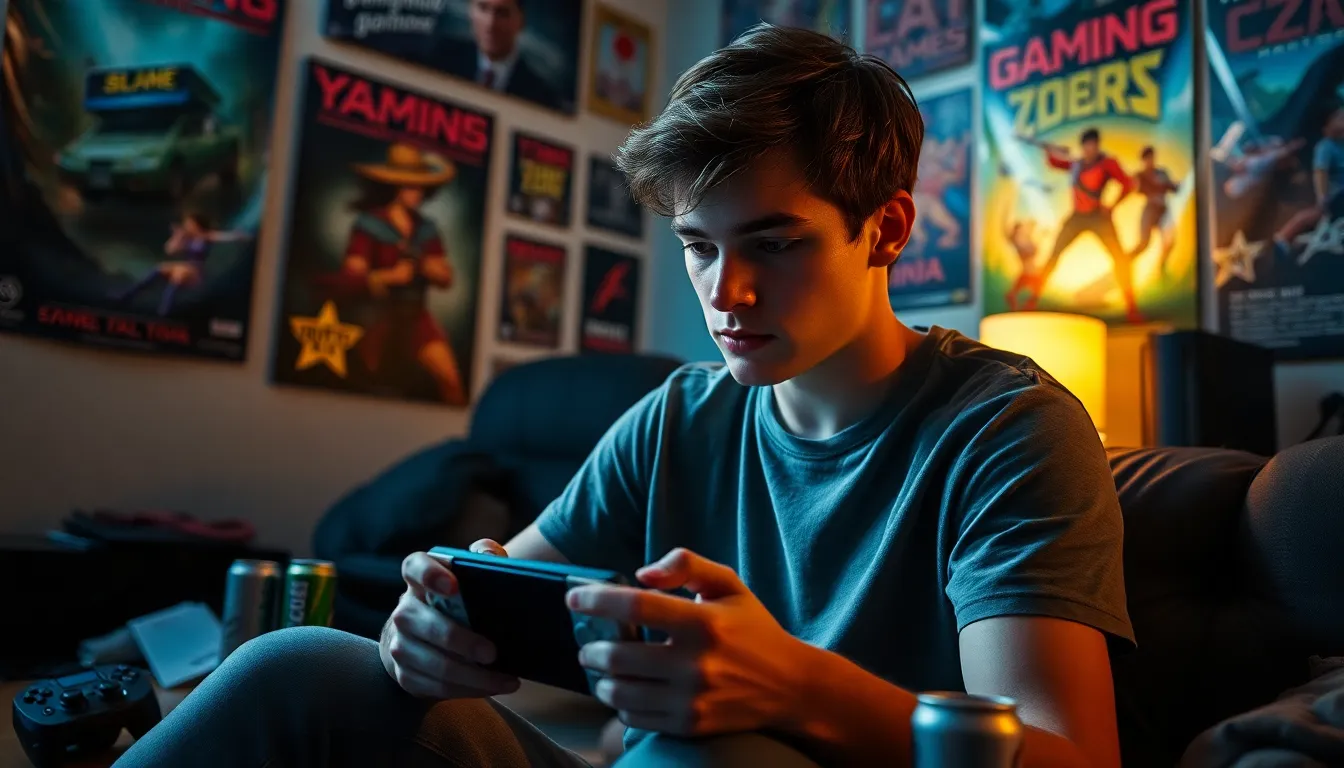In a world where gaming can feel like a thrilling rollercoaster, some players find themselves stuck on the ride a bit too long. Game Overdertoza addiction isn’t just a catchy phrase; it’s a phenomenon that’s taking over screens and stealing precious hours from daily life. Picture this: you log in for “just one more game” and suddenly it’s dawn, your snacks are gone, and your couch has claimed you as its permanent resident.
This addiction isn’t just about losing track of time; it’s about the all-consuming desire to conquer every level and claim every victory. As the stakes get higher and the competition gets fiercer, players dive deeper into the digital abyss. But how does one break free from this captivating grip? Let’s explore the signs, symptoms, and solutions to reclaiming a balanced life without sacrificing the fun.
Table of Contents
ToggleUnderstanding Game Overdertoza Addiction
Game Overdertoza addiction manifests when individuals prioritize gaming over daily responsibilities, resulting in detrimental impacts on their personal and professional lives. Symptoms often include persistent withdrawal from social interactions, neglecting work, or worsening academics.
Individuals frequently experience intense cravings for gameplay, which creates a cycle of increased engagement. Signs of this addiction may consist of significant changes in mood when unable to game, which can lead to irritability or anger. Players may disregard personal health, including skipping meals or sacrificing sleep to continue their gaming sessions.
The National Institute on Media and the Family reports that around 8.5% of gamers experience some level of gaming addiction. This statistic highlights the growing concern among healthcare professionals regarding gaming’s effects on mental health. Gamers often report difficulty in moderating their playtime even after recognizing its negative impact.
Family members and friends might notice withdrawal from social life, where a player isolates themselves for prolonged periods. These behaviors strengthen the addiction cycle, as isolation may lead to heightened feelings of loneliness with gaming as the primary source of relief.
Addressing Game Overdertoza addiction requires understanding its signs. Setting healthy boundaries around gaming can foster a balanced lifestyle. Engaging in alternative activities, like sports or hobbies, may help redirect focus away from excessive gaming. Behavioral therapies prove beneficial for many in regaining control over their gaming habits while still enjoying recreational play.
Recognizing the signs early contributes to better outcomes in managing this rising addiction. Prioritizing real-life interactions may enhance overall well-being and reduce reliance on gaming for satisfaction.
Causes of Game Overdertoza Addiction

Game Overdertoza addiction stems from various causes, including psychological factors and environmental influences. Understanding these elements is essential for addressing the issue effectively.
Psychological Factors
Psychological factors significantly contribute to Game Overdertoza addiction. Players often seek escape from real-life stressors, leading to excessive gaming. Feelings of accomplishment and success enhance the gaming experience, making it appealing. Gamers frequently develop strong emotional attachments to their in-game achievements and characters. High levels of anxiety and depression can also drive individuals to gaming as a form of avoidance. The immediate gratification from gaming creates a cycle of dependency, reinforcing the addiction.
Environmental Influences
Environmental influences play a crucial role in fostering Game Overdertoza addiction. Access to gaming technology and platforms increases the likelihood of prolonged play. Social circles that normalize excessive gaming further promote this behavior. Peer pressure can encourage individuals to prioritize gaming over daily responsibilities. Frequent exposure to gaming advertisements and social media can intensify cravings for play. Home environments lacking supportive structure often leave individuals vulnerable to addiction.
Effects of Game Overdertoza Addiction
Game Overdertoza addiction significantly impacts various aspects of life. Understanding these effects promotes awareness and supports better management strategies.
Mental Health Implications
Game Overdertoza addiction correlates with several mental health issues. Anxiety levels tend to rise as players struggle with real-life responsibilities unmet due to gaming. Depression often manifests through feelings of isolation, especially when gaming serves as an escape from reality. Mood swings become common when players can’t access their games, leading to irritability and frustration. According to studies, about 60% of individuals facing gaming addiction report symptoms of anxiety or depression. Identifying and addressing these mental health implications is crucial for recovery and maintaining overall well-being.
Social Consequences
Social interactions frequently suffer due to Game Overdertoza addiction. Players may withdraw from family and friends, prioritizing gaming over personal relationships. Over time, this social isolation can lead to a lack of support systems, making recovery even more challenging. Many individuals miss important life events, contributing to feelings of regret and loneliness. Approximately 50% of gamers experiencing addiction report a decline in their social life. Prioritizing healthy social connections remains essential for overcoming this addiction and fostering a balanced lifestyle.
Strategies for Overcoming Game Overdertoza Addiction
Addressing Game Overdertoza addiction requires a combination of professional assistance and self-directed efforts.
Professional Help
Seeking professional help proves essential for individuals grappling with addiction. Psychologists and counselors can provide targeted treatment plans. Behavioral therapies, such as cognitive behavioral therapy, effectively address gaming behavior by identifying triggers and developing coping strategies. Support groups offer valuable opportunities for sharing experiences and building community. Research indicates that approximately 60% of individuals benefit from structured therapy sessions. Accessing mental health resources early on enhances the chances of recovery and restores overall well-being.
Self-Help Techniques
Implementing self-help techniques can empower individuals to regain control over gaming habits. Journaling daily experiences encourages reflection on gaming patterns and emotional triggers. Setting specific gaming limits creates a structured approach to managing time. Engaging in alternative hobbies, such as exercise or reading, diverts attention away from gaming. Mindfulness practices, like meditation, reduce stress and improve focus. Research shows that individuals utilizing self-help strategies experience a 40% greater likelihood of reducing gaming time effectively. Creating a support network of friends and family boosts accountability and fosters healthy connections.
Addressing Game Overdertoza addiction is crucial for restoring balance in life. Recognizing the signs early and implementing healthy boundaries can significantly improve one’s mental well-being. Engaging in alternative activities and seeking professional help are vital steps toward recovery.
Building a support network of friends and family can enhance accountability and provide necessary encouragement. By understanding the psychological and environmental factors contributing to this addiction, individuals can develop effective strategies to regain control. The journey to overcoming gaming addiction may be challenging but it’s achievable with the right tools and support.





